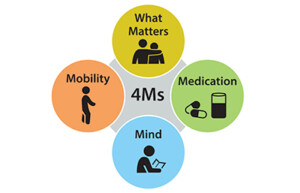
4Ms Resources
The resources below can also be found in this document HERE.
What Matters
- The Conversation Project: The Conversation Project’s Conversation Guides can help you have ‘the conversation’ with the important people in your life about your – or their – wishes for care through the end of life.
- Care for What Matters Most: HealthinAging.org provides information about choosing tests and treatments wisely, advance directives, end of life care, guardianship, and informed consent.
- What are Advance Directives?: HealthinAging.org provides information about types of advance directives including Living Wills and Durable Powers of Attorney for Healthcare.
- PREPARE For Your Care: PREPARE is a step-by-step program with video stories to help you have a voice in YOUR medical care, talk with your doctors and fill out an advance directive form to put your wishes in writing.
Medications
- Medications Work Differently In Older Adults: HealthinAging.org provides information about how medications work differently in older adults including changes in the body, having multiple medical conditions, effects of food and beverages on medications, medication interactions, and more.
- What Older Adults Can Do To Manage Medications: HealthinAging.org provides information about how to manage medications including making a list, reviewing medications regularly, looking out for side effects, and more.
- Avoiding Overmedication and Harmful Drug Reactions: HealthinAging.org provides a Tip Sheet to lower the chances of overmedication and adverse drug reactions.
- If a Medication You Take is Listed in the Beers Criteria for Potentially Inappropriate Medication Use in Older Adults: HealthinAging.org provides a Tip Sheet with what to do and what to ask if a medication you take is listed in the AGS Beers Criteria® For Potentially Inappropriate Medication Use In Older Adults.
- Ten Medications Older Adults Should Avoid or Use with Caution: HealthinAging.org provides a Tip Sheet to help you make better-informed decisions about your medications, and to lower your chances of overmedication and serious drug reactions.
- Medicines and You: A Guide for Older Adults: The FDA developed a guide for older adults that includes information about aging and health, talking to your health care professionals, what you need to know about your prescription medicine, taking prescriptions medicines, and more.
Mind
- Dementia: HealthinAging.org provides information about dementia including basic facts, causes, symptoms, diagnosis and tests, care and treatment, lifestyle and management, and what is unique to older adults.
- Depression: HealthinAging.org provides information about depression including basic facts, causes, symptoms, diagnosis and tests, care and treatment, lifestyle and management, and what is unique to older adults.
- Delirium: HealthinAging.org provides information about delirium including basic facts, causes, symptoms, diagnosis and tests, care and treatment, lifestyle and management, and what is unique to older adults.
Mobility
- CDC MyMobility Plan:CDC’s mobility planning tool can guide you to take action today to help keep yourself—or your loved ones—safe, mobile, and independent tomorrow.
- Physical Activity Resources: HealthinAging.orgprovides information about physical activity including basic facts and lifestyle and management resources.
- Balance Problems: HealthinAging.org org provides information about balance problems including basic facts, causes, symptoms, diagnosis and tests, care and treatment, and lifestyle and management.
- Falls Prevention: HealthinAging.org provides information about falls prevention including basic facts, causes, diagnosis and tests, care and treatment, lifestyle and management, and what is unique to older adults.
- CDC Still Going Strong: Still Going Strong speaks directly to older adults, age 65 and older, and their caregivers to raise awareness about preventable injuries among older adults.

